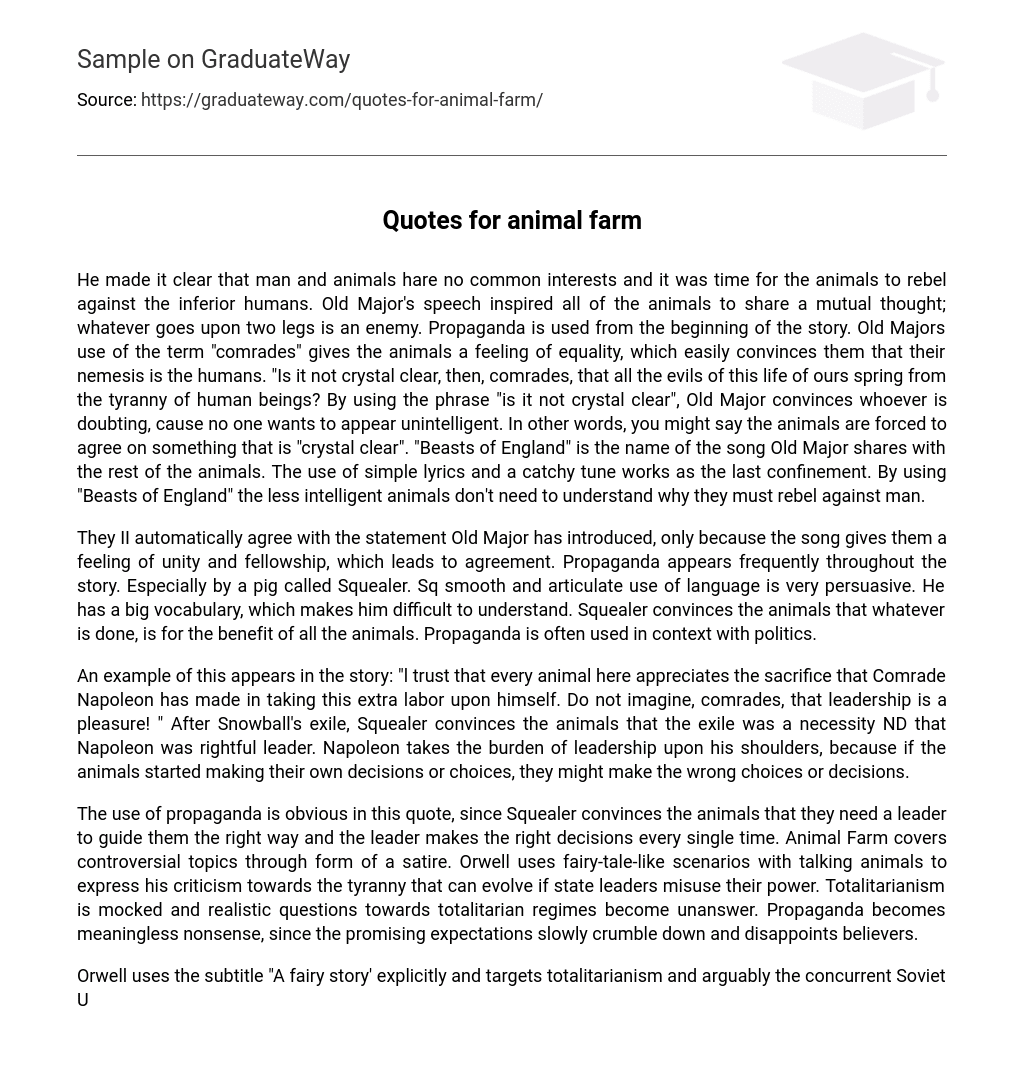He made it clear that man and animals hare no common interests and it was time for the animals to rebel against the inferior humans. Old Major’s speech inspired all of the animals to share a mutual thought; whatever goes upon two legs is an enemy. Propaganda is used from the beginning of the story. Old Majors use of the term “comrades” gives the animals a feeling of equality, which easily convinces them that their nemesis is the humans. “Is it not crystal clear, then, comrades, that all the evils of this life of ours spring from the tyranny of human beings? By using the phrase “is it not crystal clear”, Old Major convinces whoever is doubting, cause no one wants to appear unintelligent. In other words, you might say the animals are forced to agree on something that is “crystal clear”. “Beasts of England” is the name of the song Old Major shares with the rest of the animals. The use of simple lyrics and a catchy tune works as the last confinement. By using “Beasts of England” the less intelligent animals don’t need to understand why they must rebel against man.
They II automatically agree with the statement Old Major has introduced, only because the song gives them a feeling of unity and fellowship, which leads to agreement. Propaganda appears frequently throughout the story. Especially by a pig called Squealer. Sq smooth and articulate use of language is very persuasive. He has a big vocabulary, which makes him difficult to understand. Squealer convinces the animals that whatever is done, is for the benefit of all the animals. Propaganda is often used in context with politics.
An example of this appears in the story: “l trust that every animal here appreciates the sacrifice that Comrade Napoleon has made in taking this extra labor upon himself. Do not imagine, comrades, that leadership is a pleasure! ” After Snowball’s exile, Squealer convinces the animals that the exile was a necessity ND that Napoleon was rightful leader. Napoleon takes the burden of leadership upon his shoulders, because if the animals started making their own decisions or choices, they might make the wrong choices or decisions.
The use of propaganda is obvious in this quote, since Squealer convinces the animals that they need a leader to guide them the right way and the leader makes the right decisions every single time. Animal Farm covers controversial topics through form of a satire. Orwell uses fairy-tale-like scenarios with talking animals to express his criticism towards the tyranny that can evolve if state leaders misuse their power. Totalitarianism is mocked and realistic questions towards totalitarian regimes become unanswer. Propaganda becomes meaningless nonsense, since the promising expectations slowly crumble down and disappoints believers.
Orwell uses the subtitle “A fairy story’ explicitly and targets totalitarianism and arguably the concurrent Soviet Union. Another ridiculing method is through the representation of totalitarian leaders by pigs. The irony, the humorous language and the mockery gives the novel a feature of pleasure and entertainment, which initially is the purpose of a genuine fairy story. With n open ending where questions are unanswered, readers must conclude for themselves; what’s the purpose of the story’ and who’ll answer the radical questions that are asked in the story?
Orwell leaves readers without a happy ending, which works as an implicit message. A totalitarian regime has no happy ending; thereby the story has no happy ending. By portraying realistic situations with a touch of entertainment, Orwell has created a fairy story without a happy ending. Difficult questions have been asked and many left unanswered, as a provocative method for people to realize the consequences of certain decisions. In this case the “victim” is totalitarianism. The use of language in the story is well thought out and very eloquent.
The purpose of the language is convincing the reader to see they problems with a corrupt leader. The propaganda in story is used to show the process of arguing that took place in some regimes. As a reader, we get a crystal clear feeling that the narrator is oppose to the leadership of the farm. It is presented in a very oblique manner, which contributes to leaving some questions unanswered. The form Of a satire makes the novel a fairy Story and probably the most controversial satire in the 20th century.





